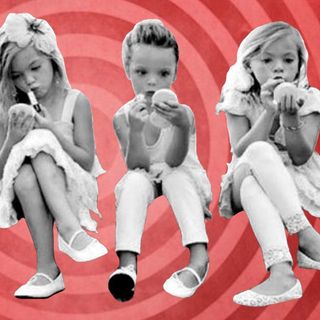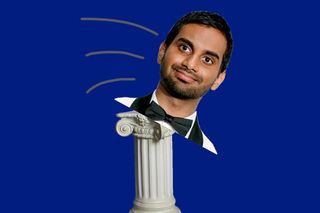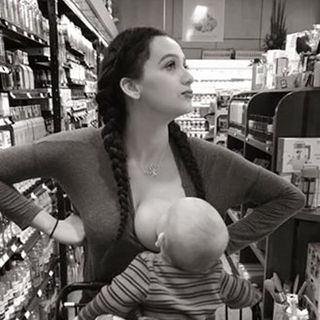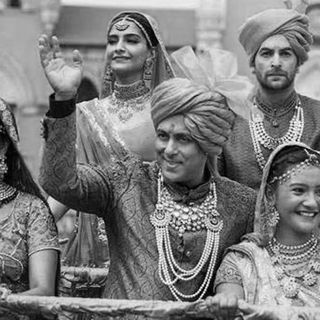
Why Do We Still Worship Celebrities in 2018?
We should question how much power we give people we’ve never met.

Earlier this year, an anonymous woman published a piece on Babe calling out Aziz Ansari for behaving in a sexually coercive manner on a date. The piece was criticized for spending too much time on details that took away from the bigger story, but ultimately, its point was made: Ansari had positioned himself as a hyper-liberal champion of women and minorities, but he was not the inspirational brown role model the world thought he was. If he was susceptible to failing us like this, which celebrity wasn’t?
Apparently, no one, if the latest #MeToo accusations are anything to go by, and as rumors of widespread sexual harassment swirl around Bollywood. Perhaps the real question is this: Why are we still idolizing celebrities in 2018?
In Hollywood, minority celebrities are especially idolized, as if they’ve signed a fame contract with a clause to uphold the values of the community they represent. Over the past few decades, the main argument driving the case for representation in American media has been that non-white people need to see stars who look more like them. We want idols we can see ourselves in.
It may seem counterintuitive that Indians seek representation in Hollywood when we have our own film industry. But Bollywood, Tollywood, or any of our other regional cinema often fail to represent us accurately. Indian movies cast the fairest actors, storylines tend to be sexist and male-centric, and they often show a strange, classless world without poverty or casteism.
And when Bollywood celebrities make mistakes, they’re immediately forgiven. We’ve taken the term ‘celebrity idol’ to the next level, giving our celebrities at home celestial status, right next to Brahma, Vishnu, and Shiva. Though all of this is changing, many Indians still look to Hollywood to take on issues that aren’t being addressed in our own country.
As a result, when brown actors in Hollywood mess up, the blow feels particularly deep. An artist who was meant to represent our community instead made mistakes that we don’t want to be associated with. When they mess up, we want to disown them.
It wasn’t always like this. Only 50 years ago, the concept of celebrity looked completely different. Stars like Audrey Hepburn and Nargis were aspirational, sure; admired for their grace and poise. But they were never idolized for their beliefs like they are today. Celebrities just weren’t expected to be political activists; back then, it wasn’t part and parcel of being famous.
Today, however, celebrity has permeated every facet of our culture, to the extent that we don’t find it strange when famous people get political — we herald them for it. Priyanka Chopra’s savage takedown of a chauvinist interviewer goes viral with captions like, “Where do I sign up to be her best friend?” And when Riz Ahmed calls out racism in his songs and interviews, Time includes him in their list of 100 Most Influential People with the line, “We’re alive at the same time as Riz Ahmed!” We now expect famous people to champion, and to some extent shape, our ideological beliefs. And when they do, we idolize them.
But celebrities have proven, time and time again, that they’re not infallible. In all likelihood, the celebrity idol du jour will eventually do something that causes them to fall out of favor. With some, like Ansari, it’s difficult to predict their downfalls; with others, the gaps in their ideological armors begin to show even before the public turns on them. Chopra was just cast in a movie starring Salman Khan — clearly, her feminist takedowns don’t extend to domestic abusers. And underground rumblings of sexual assault have been plaguing Ahmed for the past year.
This isn’t to say that celebrities should never try and set a good example. Bollywood could use more actors who take a moral stand. And we should certainly stop defending and glorifying celebrities who have committed actual crimes. It’s not unfair to expect celebrities to act like decent human beings. It’s not even unfair to expect them to have educated, nuanced ideological standpoints. They are in positions of immense power, and we’ve all heard the cliché about what comes with great power. But it’s time for us to re-evaluate how much power we choose to give them.
Celebrities can make big mistakes, ones that are inconsistent with their public image. Because we only see one — often artificially constructed — side of them, these mistakes can feel shocking and heartbreaking.
Think about it: How many people do we personally know who we believe in unconditionally, who we know would never let us down, who we’d follow unquestioningly in a crisis? There may be a few — but it’s fair to assume they’re people in our inner circle, or people we’ve known a long time. Celebrities are, in effect, total strangers. For the most part, we don’t know how they’d behave in a crisis; we don’t know what they actually believe; in most cases, we don’t even know how they’d treat us if they saw us face to face.
In 2018, when our ideological standpoints matter more now than ever, the idea of the celebrity idol should seem stranger and stranger. It’s not just #MeToo that should be making us question who we ‘stan.’ Our views are ever-evolving, making the chances pretty slim that our favorite celebrity’s views will evolve the same way. We may relate to them today, but tomorrow their ideas could seem repugnant. (See: 2013 Jennifer Lawrence, Oscars-tripping everygirl, versus 2016 Jennifer Lawrence, cultural offender.)
In this climate, we should still advocate and celebrate representation in the media. We should still support artists whose talents we admire. We should continue to expect celebrities, minority or otherwise, to be responsible with their power. But we should never forget that one day, they may very well fail us.
Urvija Banerji is the Features Editor at The Swaddle, and has previously written for Rolling Stone India and Atlas Obscura. When she's not writing, she can be found in her kitchen, painting, cooking, picking fights online, and consuming large amounts of coffee (often concurrently).
Related


Can Indian Moms Breastfeed in Public Without Being Shamed?
